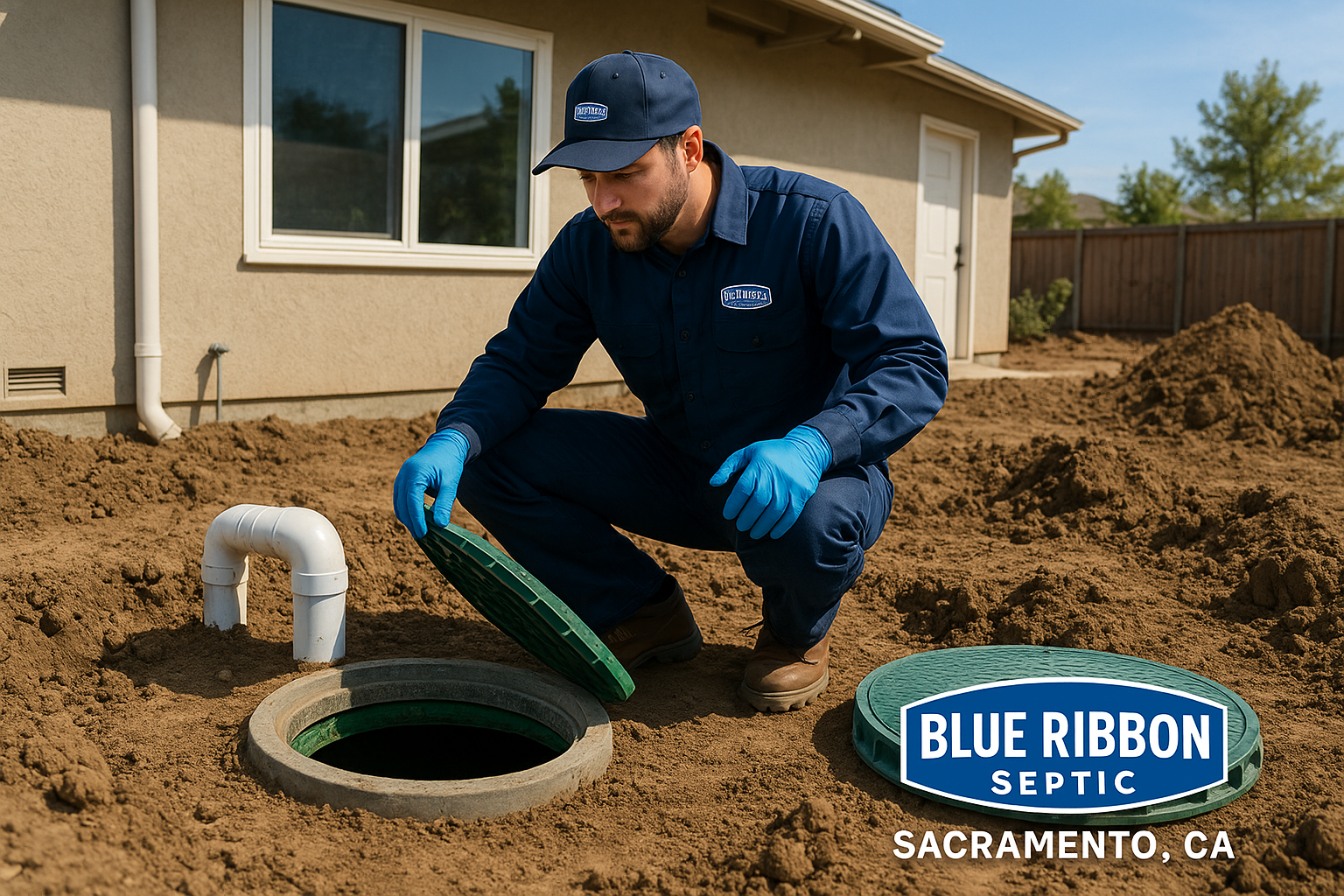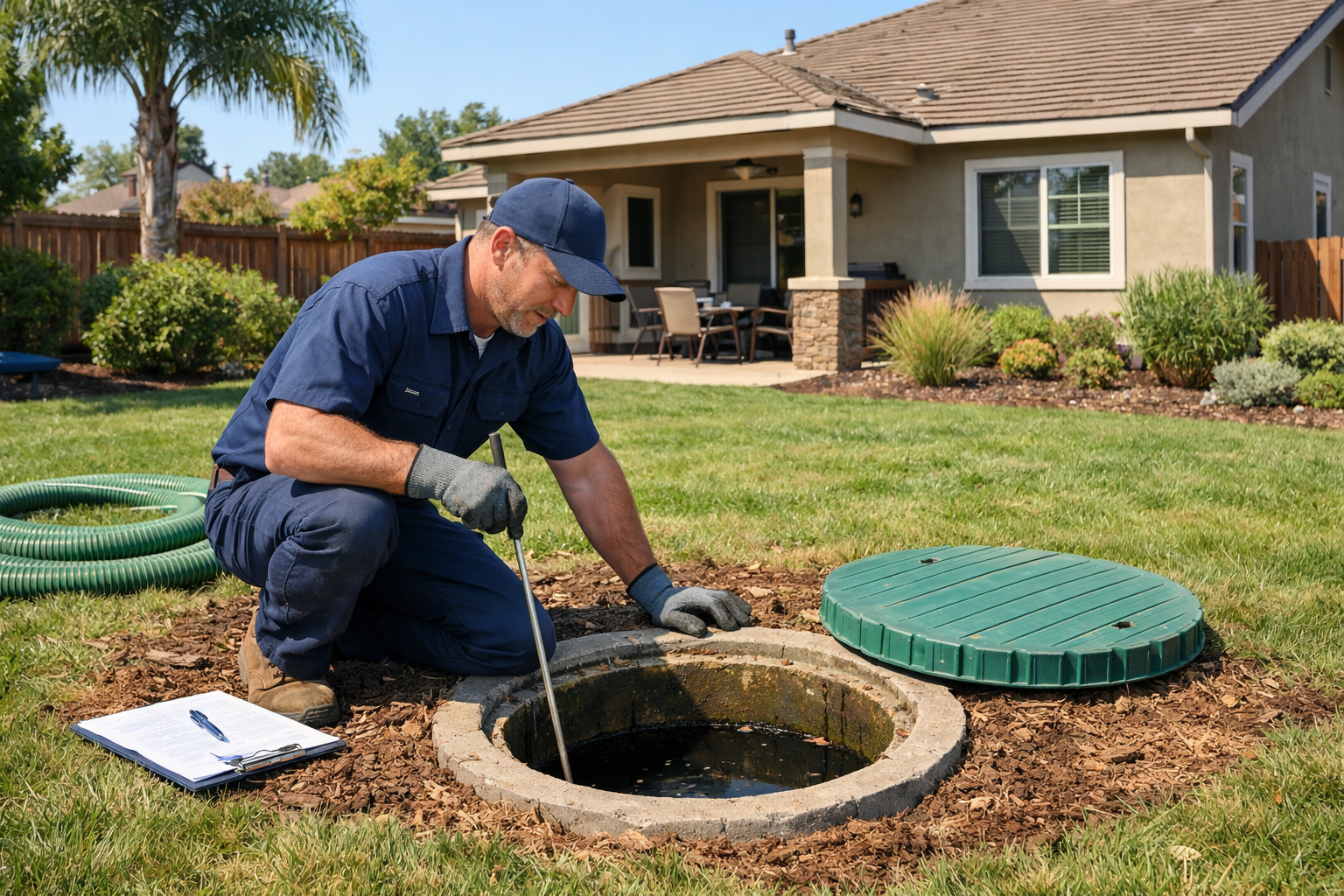Did you know that more than 60 million Americans rely on septic tanks to treat and dispose of household wastewater? In Sacramento County, where many homes lie outside the city’s sewer lines, a septic tank is not just a convenience: it’s a necessity.
A septic tank is an essential part of any home’s wastewater system, yet many homeowners don’t understand how a septic tank works or what’s required to maintain it. Without proper septic tank cleaning and inspection, this underground system can turn into a costly septic tank repair or even a health hazard.
In this guide, we’ll explain what a septic tank is, how it functions, and why regular care is vital—especially for homeowners in Sacramento, CA. You’ll also get professional insights and maintenance tips from Blue Ribbon Septic to help you keep your system healthy for years to come.
Understanding What a Septic Tank Is and Why It Matters
A septic tank is a watertight underground chamber designed to collect, treat, and dispose of household wastewater. Homes that don’t connect to municipal sewer systems rely on septic tanks to handle waste treatment independently.
According to the U.S. Environmental Protection Agency (EPA), septic systems use natural processes to safely treat wastewater, protecting both human health and the environment.
The Basics of a Septic System
A standard septic system has two main parts:
- The Septic Tank: A buried chamber—often a concrete septic tank—that separates solids, oils, and grease from wastewater.
- The Drainfield (Leach Field): A network of underground pipes that filters treated water into the soil.
When wastewater leaves your home’s sinks, toilets, and showers, the septic tank naturally separates and processes waste through biological decomposition.
Why It Matters for Homeowners
A well-functioning septic tank:
- Protects public health by properly treating waste.
- Prevents groundwater contamination.
- Reduces dependency on city sewer systems.
- Supports eco-friendly waste breakdown.
For homeowners in Sacramento, CA, this means greater independence, environmental protection, and property value preservation.
How Does a Septic Tank Work? Step-by-Step Breakdown
Understanding how a septic tank works can help you spot early warning signs and avoid unnecessary septic tank repair costs.
1. Wastewater Flows from the Home
Every time you flush a toilet, run a washing machine, or take a shower, wastewater travels through your plumbing system into the septic tank. Homes in Sacramento’s rural areas depend on this private system since they’re not connected to city sewer lines.
2. Solids Settle and Separate
Inside the tank, waste separates into three layers:
- Scum Layer: Oils and grease float to the top.
- Effluent Layer: The middle layer, mostly liquid.
- Sludge Layer: Solids that settle to the bottom.
Beneficial bacteria begin breaking down waste, but some solids remain. This is why professional septic tank cleaning and pumping every 3–5 years is crucial.
For more information on installation and costs, visit HomeAdvisor’s septic tank installation guide.
3. Effluent Flows to the Drainfield
Once treated, the liquid effluent leaves the septic tank and flows through perforated pipes into the drainfield. The soil filters out harmful bacteria and nutrients before the water safely re-enters the groundwater.
If you suspect issues with outlet baffles or drainage, schedule a tank locating and outlet baffle replacement service promptly.
4. Bacterial Breakdown and Soil Filtration
Microorganisms in the tank and soil digest organic materials, breaking down harmful pathogens and converting wastewater into clean water. If your drainfield becomes saturated, it may require septic tank pump out or lift station pumping to restore balance.
For a detailed explanation, see Angi’s guide on how septic systems work.
5. Continuous Natural Cycle
With regular care and septic tank pumping services near me, this system continuously recycles wastewater safely. A properly maintained system works like a self-contained treatment plant, providing a sustainable wastewater solution for Sacramento homeowners.
Importance of Septic Tanks in Sacramento, CA
Many Sacramento-area homes—in Elk Grove, Wilton, and Rancho Murieta—depend on septic tanks. Proper care ensures efficiency, safety, and environmental protection.
Local Groundwater Protection
Sacramento sits above an extensive groundwater basin. A failing septic tank can leak bacteria and nitrates into wells and groundwater. Regular septic tank inspections protect both your property and public health.
Rural and Semi-Rural Living
For homes outside Sacramento’s sewer lines, installing a concrete septic tank ensures waste is managed safely and independently. Proper septic tank maintenance supports reliable, long-term wastewater treatment.
Regulatory Oversight
The Sacramento County Environmental Management Department enforces strict septic regulations. Stay compliant by scheduling real estate septic system inspections with Blue Ribbon Septic to meet local environmental and safety standards.
To learn more about environmental compliance and excavation procedures, visit the U.S. Department of Energy’s septic tank excavation guide.
Expert Tips for Septic Tank Maintenance
Even the best septic systems need regular upkeep. Follow these expert tips to prevent breakdowns and costly septic tank repair.
Top Septic Maintenance Tips
- Pump Regularly: Schedule septic tank pumping services every 3–5 years.
- Inspect Annually: Hire certified septic tank inspectors to check for cracks or leaks.
- Conserve Water: Install low-flow fixtures and repair leaks quickly.
- Avoid Harsh Chemicals: These disrupt the bacterial balance inside the tank.
- Protect the Drainfield: Keep vehicles and heavy equipment off the area.
Common Mistakes to Avoid
- Ignoring foul odors or slow drains.
- Using chemical additives instead of professional septic tank cleaning.
- Skipping maintenance logs or inspection records.
- Attempting DIY pumping instead of hiring licensed experts.
Key Takeaways: Why Septic Knowledge Equals Savings
A septic tank is more than a hidden part of your plumbing—it’s a vital environmental system. Understanding how a septic tank works can save you money and protect your home.
Remember:
- A septic tank treats wastewater naturally.
- Regular septic tank cleaning prevents expensive repairs.
- Professional care from Blue Ribbon Septic ensures long-term reliability and compliance.
Frequently Asked Questions (FAQs)
1. How often should I pump my septic tank in Sacramento, CA?
Most homes need a septic tank pump out every 3–5 years. Blue Ribbon Septic can assess your usage and recommend the best schedule.
2. What are signs my septic tank needs service?
Watch for slow drains, foul odors, or pooling water. These are common signs your septic tank or drainfield needs attention.
3. Can I use a garbage disposal with a septic tank?
It’s best to limit use, as food waste increases solids and frequency of septic tank cleaning.
4. Are septic tanks safe for the environment?
Yes. According to the EPA, properly maintained septic systems are a sustainable and eco-friendly wastewater solution.
5. How long does a septic system last?
With professional maintenance and inspection, a septic system can last 25–40 years or more.
For trusted septic tank pumping services near Sacramento, CA, contact Blue Ribbon Septic today for expert cleaning, inspection, and repair solutions that keep your system running efficiently.






